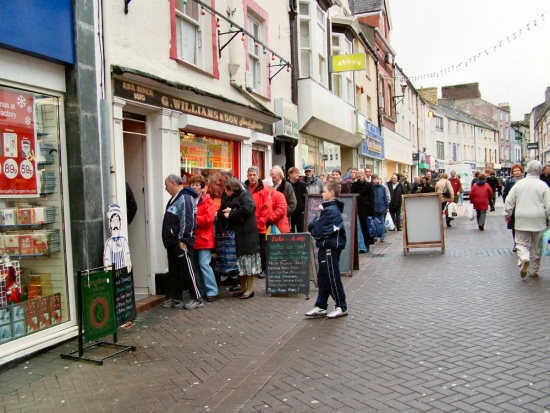The past few years have been tough for most British families. Rising inflation, mounting numbers of people unable to find work and the high cost of everyday items have left many consumers out of pocket and struggling to make ends meet.

Additionally, retail businesses have found it difficult to attract customers due to a lower disposable income per household, meaning that many well known brands such as Aquascutum, Clinton Cards and JJB Sports have been forced into administration.
However, it appears that the end of the recession is in sight, with the latest figures from the high street indicating that 2013 will be a much more financially stable year for everyone.
Clothing sales alone in September rose by 2 per cent when compared to the previous month, largely thanks to the back to school rush as parents bought new uniforms and clothing for their children’s first term back after the summer holidays. The recent cold snap has also helped the high street back onto its feet.
Due to the washout summer, clothing sales failed to reach the levels of previous years. Summer staples such as shorts, t-shirts and dresses barely shifted from the shelves, with consumers preferring to tackle the wind and rain in waterproofs and wellington boots instead. Yet last month, when autumn stock began to arrive, high street stores saw a huge increase in the number of warm coats and jumpers sold as consumers prepare for what could well be a cold winter.
Technological sales were also boosted massively this quarter, largely thanks to the launch of Apple’s new must-have product, the iPhone 5. Apple stores nationwide saw queues forming outside on the day of the official launch, with the waiting list for the iconic item still stretching well into October. As a result of this, telecoms equipment and computer sales grew by a massive 7.6 per cent in September.
Of course, with the retail sector performing well, it stands to reason that the economy overall has taken a turn for the better.
Economist at HIS Global Insight Howard Archer says; “Decent retail sales in September and robust overall expansion in the third quarter indicates that consumer spending made an appreciable positive contribution to GDP growth.
“We have pencilled in GDP growth of 0.6-0.7 per cent quarter on quarter in the third quarter as it was lifted by the making up of some activity lost to the extra day public holiday in the second quarter and received an overall limited boost from the Olympic Games.”
However, the fact that sales rose in September does not necessarily mean that the recession is over. Many energy providers are putting up their prices this winter, while the Government’s proposed rise in fuel tax means that motorists are once more being hit with higher costs to fill up their cars from January of next year.
UK economist at Capital Economics Samuel Tombs warns that households should not necessarily revert back to pre recession levels of spending just yet, as while the worst may be over, saving money is still sensible in the current unstable economic climate.
He says; “September’s rise in the official measure of UK retail sales volumes suggests that consumers loosened their purse strings a little, albeit partly due to temporary factors.
“Looking ahead, the renewed pressure on households’ income suggests that sales volumes will struggle in the coming months.”
Of course, everyone wants the recession and the constant money worries to end. But with the Eurozone crisis still looming over the UK, and our own pay freezes, inflation and rising essential costs to deal with, it is doubtful that households will feel much relief until well into the new year.
Retailers, however, can breathe a sigh of relief at last month’s respite from the constant sales dip in this country over the past few years.
Do you think recovery on the high street automatically indicates that the recession is loosening its grip on household budgets? How should retailers capitalise on this recent burst of consumer spending enthusiasm, and do you think it’s going to last throughout the third quarter with Christmas just around the corner?
Previous Post
Supermarkets-the Super Banks of the Future